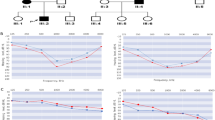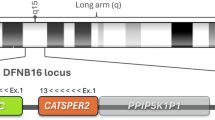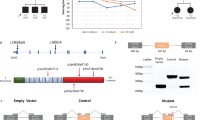Abstract
Mutations in the DFNA5 gene are known to cause autosomal dominant non-syndromic hearing loss (ADNSHL). To date, five DFNA5 mutations have been reported, all of which were different in the genomic level. In this study, we ascertained a Korean family with autosomal dominant, progressive and sensorineural hearing loss and performed linkage analysis that revealed linkage to the DFNA5 locus on chromosome 7. Sequence analysis of DFNA5 identified a 3-bp deletion in intron 7 (c.991-15_991-13del) as the cause of hearing loss in this family. As the same mutation had been reported in a large Chinese family segregating DFNA5 hearing loss, we compared their DFNA5 mutation-linked haplotype with that of the Korean family. We found a conserved haplotype, suggesting that the 3-bp deletion is derived from a single origin in these families. Our observation raises the possibility that this mutation may be a common cause of autosomal dominant progressive hearing loss in East Asians.
Similar content being viewed by others
Log in or create a free account to read this content
Gain free access to this article, as well as selected content from this journal and more on nature.com
or
References
Morton, N. E. Genetic epidemiology of hearing impairment. Ann. NY Acad. Sci. 630, 16–31 (1991).
Chatterjee, A., Jalvi, R., Pandey, N., Rangasayee, R., Anand, A. A novel locus DFNA59 for autosomal dominant nonsyndromic hearing loss maps at chromosome 11p14.2-q12.3. Hum. Genet. 124, 669–675 (2009).
van Camp, G., Coucke, P., Balemans, W., van Velzen, D., van de Bilt, C., van Laer, L. et al. Localization of a gene for non-syndromic hearing loss (DFNA5) to chromosome 7p15. Hum. Mol. Genet. 4, 2159–2163 (1995).
Van Laer, L., Van Camp, G., van Zuijlen, D., Green, E. D., Verstreken, M., Schatteman, I. et al. Refined mapping of a gene for autosomal dominant progressive sensorineural hearing loss (DFNA5) to a 2-cM region, and exclusion of a candidate gene that is expressed in the cochlea. Eur. J. Hum. Genet. 5, 397–405 (1997).
Van Laer, L., Huizing, E. H., Verstreken, M., van Zuijlen, D., Wauters, J. G., Bossuyt, P. J. et al. Nonsyndromic hearing impairment is associated with a mutation in DFNA5. Nat. Genet. 20, 194–197 (1998).
Bischoff, A. M., Luijendijk, M. W., Huygen, P. L., van Duijnhoven, G., De Leenheer, E. M., Oudesluijs, G. G. et al. A novel mutation identified in the DFNA5 gene in a Dutch family: a clinical and genetic evaluation. Audiol. Neurootol. 9, 34–46 (2004).
Cheng, J., Han, D. Y., Dai, P., Sun, H. J., Tao, R., Sun, Q. et al. A novel DFNA5 mutation, IVS8+4 A>G, in the splice donor site of intron 8 causes late-onset non-syndromic hearing loss in a Chinese family. Clin. Genet. 72, 471–477 (2007).
Van Laer, L., Meyer, N. C., Malekpour, M., Riazalhosseini, Y., Moghannibashi, M., Kahrizi, K. et al. A novel DFNA5 mutation does not cause hearing loss in an Iranian family. J. Hum. Genet. 52, 549–552 (2007).
Yu, C., Meng, X., Zhang, S., Zhao, G., Hu, L., Kong, X. A 3-nucleotide deletion in the polypyrimidine tract of intron 7 of the DFNA5 gene causes nonsyndromic hearing impairment in a Chinese family. Genomics 82, 575–579 (2003).
Park, H. J., Shaukat, S., Liu, X. Z., Hahn, S. H., Naz, S., Ghosh, M. et al. Origins and frequencies of SLC26A4 (PDS) mutations in east and south Asians: global implications for the epidemiology of deafness. J. Med. Genet. 40, 242–248 (2003).
Van Laer, L., Coucke, P., Mueller, R. F., Caethoven, G., Flothmann, K., Prasad, S. D. et al. A common founder for the 35delG GJB2 gene mutation in connexin 26 hearing impairment. J. Med. Genet. 38, 515–518 (2001).
Yan, D., Park, H. J., Ouyang, X. M., Pandya, A., Doi, K., Erdenetungalag, R. et al. Evidence of a founder effect for the 235delC mutation of GJB2 (connexin 26) in East Asians. Hum. Genet. 114, 44–50 (2003).
Acknowledgements
We are grateful to the family for their collaboration in this study. We also thank Dr Xiangyin Kong for providing Chinese samples. This work was supported by the Korea Science and Engineering Foundation (KOSEF) grant funded by the Korea government (MEST) (R01-2008-000-10431-0), a grant of the Korea Healthcare technology R&D Project, Ministry for Health, Welfare and Family Affairs, Republic of Korea, A080588 (UKK) and the National Institutes of Health intramural research fund Z01-DC-000060.
Author information
Authors and Affiliations
Corresponding author
Additional information
Supplementary Information accompanies the paper on Journal of Human Genetics website (http://www.nature.com/jhg)
Supplementary information
Rights and permissions
About this article
Cite this article
Park, HJ., Cho, HJ., Baek, JI. et al. Evidence for a founder mutation causing DFNA5 hearing loss in East Asians. J Hum Genet 55, 59–62 (2010). https://doi.org/10.1038/jhg.2009.114
Received:
Revised:
Accepted:
Published:
Issue date:
DOI: https://doi.org/10.1038/jhg.2009.114
Keywords
This article is cited by
-
Channelling inflammation: gasdermins in physiology and disease
Nature Reviews Drug Discovery (2021)
-
Further evidence for “gain-of-function” mechanism of DFNA5 related hearing loss
Scientific Reports (2018)
-
Associations of genetic variations in EYA4, GRHL2 and DFNA5 with noise-induced hearing loss in Chinese population: a case- control study
Environmental Health (2015)
-
Targeted massive parallel sequencing: the effective detection of novel causative mutations associated with hearing loss in small families
Orphanet Journal of Rare Diseases (2012)
-
The DFNA5 gene, responsible for hearing loss and involved in cancer, encodes a novel apoptosis-inducing protein
European Journal of Human Genetics (2011)



